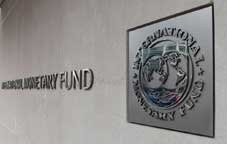
Georgia and IMF Reach Agreement on $289 million Macroeconomic Program
By Khatia Bzhalava
Monday, April 4, 2022
IMF mission chief James John announced on Friday that Georgia and the International Monetary Fund (IMF) have reached a deal on a $289 million program for the macroeconomic and financial stability of the country. As the IMF's statement reads, the International Monetary Fund team led by Mr. James John held virtual meetings with Georgian officials between November 18, 2021, and March 31, 2022, to discuss a three-year economic program that could be supported by the IMF under a Stand-By Arrangement (SBA).
According to him, Georgia’s economy was enjoying a strong recovery from the COVID-19 pandemic, emphasizing the 10,4 percent growth in 2021 before the Russian invasion of Ukraine. He also noted that economic growth in Georgia was expected to decrease to around three percent in 2022 due to the war in Ukraine and sanctions imposed against Russia, underscoring the probability of rising inflation, and widening of the current account deficit.
“Georgia’s economy has proven resilient in the past, and with the support of policies under the authorities’ program, we expect growth to pick up in 2023 and other key indicators to strengthen as well,” he noted.
According to John, the authorities’ program aims to maintain and further entrench macroeconomic stability in the context of shocks from the pandemic and the war in Ukraine, strengthen medium-term growth, and enhance economic resilience.
“To strengthen growth and make it more inclusive, the authorities’ structural reform priorities focus on education and training to tackle high unemployment and address labor market mismatches, and on upgrading the country’s infrastructure,” UMF mission chef noted adding that actions in these areas will improve the business environment, foster regional integration, and enhance the country’s potential as a transportation and logistics hub.
According to the statement, the IMF team met with the Governor of the National Bank of Georgia Mr. Gvenetadze, Minister of Finance Mr. Khutsishvili, Minister of Economy and Sustainable Development Levan Davitashvili and his predecessor Natia Turnava, and other senior government officials, as well as with representatives of Georgia’s international development partners, civil society, and the banking and business communities.


